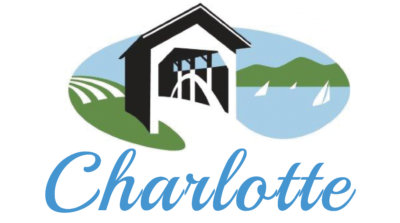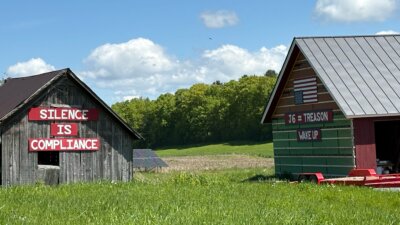Residents question 23-acre solar array
The Charlotte Planning Commission met on Nov. 6; one topic on the agenda was a response letter that will go out to DG Vermont Solar about its application for a 23-acre solar array project. Michael and Margaret Russell own the property at 2257 Lake Road where the solar array will be constructed; because the project is so large, it falls under the state’s Public Utilities Commission’s purview and does not need municipal approval to proceed.

The Pringle Solar Project was originally proposed a year ago by Morgan Kerns, Lead Project Manager for DG Vermont Solar, and states that it was “selected as part of the 2019 Standard Offer Program by the Commission after recommendation by the Standard-Offer Facilitator,” as stated in a 45-day notice given to the Town of Charlotte. The 23-acre solar array will be in designated “Rural” zones.
“We stress again that it’s the applicant’s responsibility to communicate frequently with their neighbors and to include all neighbors in that communication group, which they clearly had not done to date,” stated Larry Lewack, Charlotte town planner. Beyond this single oversight made by DG Vermont Solar, the application seems to have multiple issues that need fixing.
These issues range from not communicating with the residents near the plot of land that will be used, not following Charlotte land use regulations and not being as thorough on the application as they should have been. Before the Planning Commission decided anything, they wanted to hear comments from the public about the changes and any concerns about the project in general.
“We’re wondering about the groundwater reach relative to the panels and the increased runoff related to that and what the stormwater measures are going to be to reduce the impact of that,” stated Kristen Destigter, Charlotte community member and neighbor, during the public comment forum. “And then from an environmental perspective, we believe that the panels contain cadmium and that if damaged, there could be runoff. And we’re wondering what the measures would be in place to recognize damaged panels quickly and replace them.”
The biggest concern with members of the public who spoke during the meeting was Vermont Solar’s lack of communication with Charlotte residents during this process.
“It said that we were invited to an open house, which is not true. I know this because I’m the one that invited all the neighbors to the open house. The application says that the adjoining landowners were sent a welcome package that never happened in the initial proposal,” said Clark Derber.
The 45-day notice given to the Planning Committee by DG Vermont Solar also states that the construction of this project would only take one month, but many residents said they have heard it will actually be closer to three. This notice also outlines the environmental and aesthetic impacts this project will have on the community.
“The Project will not result in undue adverse impacts to the aesthetics, scenic, and natural beauty of the area, and the Project would not violate any town or regional standards pertaining to scenic or open space resources,” states DG Vermont Solar.
The environmental impact worries many residents as well. Most of the concerns have to do with the underground powerlines that will be essential to making this project possible.
“It’s a low risk, but obviously I’d rather have zero risk than a low risk, especially considering the amount of exposure. And they’re saying that this would be where the trail, the town trail would be on top of where these power lines are buried. And it’s like, how comfortable are people going to be using the town trail? To know that three feet under them are these high voltage lines, or not even three feet,” Derber said.
To date the only environmental impacts DG Vermont Solar has addressed are in terms of land use.
“The project will be designed to avoid/minimize impacts to Class II wetlands and corresponding wetland/riparian buffers. DG Vermont Solar plans to optimize the Project design set forth in Exhibit 1 to incorporate input from applicable state agencies,” states DG Vermont Solar.
The Planning Commission assured the public that it will be more involved in this process moving forward.
The three amendments added to the response letter to DG Vermont Solar were voted on and passed unanimously. This decision made by the Planning Commission will now be sent to the Charlotte Selectboard for review and to make any changes they see fit.
Community News Group is made up of journalism students at the University of Vermont. They partner with local newspapers to provide quality local content and give students journalism experience.
Related Stories
Popular Stories
If you enjoy The Charlotte News, please consider making a donation. Your gift will help us produce more stories like this. The majority of our budget comes from charitable contributions. Your gift helps sustain The Charlotte News, keeping it a free service for everyone in town. Thank you.
Andrew Zehner, Board Chair







